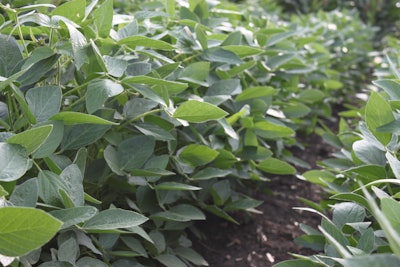
MFA Incorporated has announced updated internal policies for the sale and use of dicamba herbicides for the 2018 growing season.
The new policy will be responsive to actual growing conditions, which could be more restrictive than guidelines announced by the Missouri Department of Agriculture in November, according to Dr. Jason Weirich, MFA Incorporated director of agronomy.
“We need dicamba technology to combat weed resistance, but we have to be good stewards,” Weirich said. “Protecting the technology for the future is important, not only from an economic standpoint but also an environmental standpoint.”
MFA will launch an intensive scouting protocol this spring to track soybean growth and provide timely information to applicators about crop progress. A network of “sentinel plots” will be established, representing the average planting dates and maturity ranges of soybeans in different regions of MFA’s service territory. These plots will be scouted every Monday and reports sent to all MFA employees on Tuesday mornings with notes about maturity and potential cutoff dates for spraying dicamba.
Applicators will be alerted when the majority of soybeans in their area have reached the reproductive stage, when dicamba injury can do the most harm to non-target plants.
While Missouri has mandated that the cutoff date will be June 1 for 10 counties in the Bootheel and July 15 statewide, MFA’s policies are based on plant maturity rather than calendar dates, Weirich explained. However, he stressed, no dicamba applications will be made after government-mandated deadlines.
“Once soybeans hit the R1 growth stage, we’re done spraying dicamba due to the inherent risk of off-target movement,” he said. “We feel like it’s important to base our decisions on actual growth stages, and R1 is at the beginning of flowering. If we wait until too late in the season, we’re afraid that we will put too many soybeans in our territory at risk.”
Dicamba is a selective herbicide that controls broadleaf weeds. Plants with dicamba-tolerant traits can be sprayed with these herbicides to control weeds without damaging the crop. The technology helps growers control weeds that have developed resistance to other herbicides.
When dicamba-tolerant soybeans and cotton were approved for use in 2016 by the federal government, no dicamba herbicides were approved for the new crop system. For the 2017 season, new dicamba formulations were authorized for use with dicamba-tolerant crops, including Monsanto’s XtendiMax, BASF’s Engenia and DuPont’s FeXapan.
As part of its new guidelines, MFA Incorporated will not custom apply or sell over the counter any old formulation of straight dicamba products such as Banvel, Clarity and Detonate. This does not include blended products such as Range Star, DiFlexx and Status. These actions are in response to widespread complaints that dicamba herbicides drifted and harmed nontolerant crops during the 2017 growing season. Nationwide, 3.6 million acres of soybeans suffered harm associated with dicamba, and states launched 2,708 investigations into dicamba-related crop damage, according to data compiled by the University of Missouri. Missouri received about 310 complaints from growers related to dicamba, second only to the nearly 1,000 filed in Arkansas, which has effectively banned the herbicide’s use by setting April 15 as the cutoff for applications.
“This technology is up for renewal by the EPA in December 2018, and if we have another outcome like we did last year, we may not have this tool anymore,” Weirich said. “We hope MFA’s proactive move will set a trend so that other companies, applicators and farmers will follow our lead to help protect this technology.”
Under the Missouri Department of Agriculture’s rules, anyone spraying dicamba must have a certified private applicator license or certified commercial applicator license, the latter of which applies to MFA employees. Before purchase or use of the product, both private and commercial applicators must complete mandatory dicamba training provided by the University of Missouri Extension. Weirich said MFA Incorporated is working with MU’s Dr. Kevin Bradley to make sure the company’s applicators receive this training.
For more information, visit mfa-inc.com/news, where the latest information will be posted throughout the growing season.
















